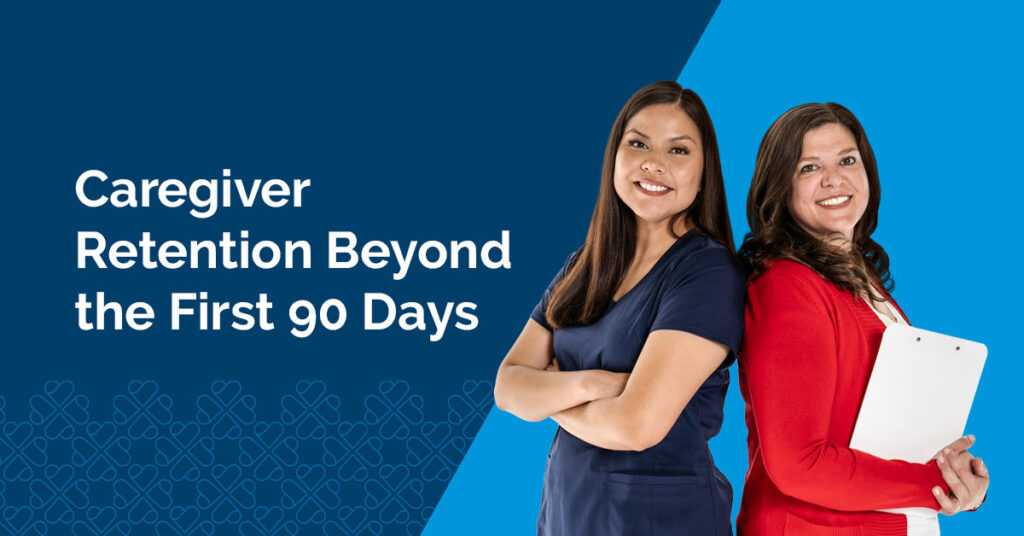
By Erika Ehlers, Sr. Director of Learning
Originally published by HomeCare Magazine
We all recognize the importance of the first 90 days in employee retention, with 30% of employees shown to quit during this period. Given the costs associated with replacing new hires, retaining them during this initial phase is essential.
But what happens after those 90 days? While data suggests that those who stay for 90 days are likely to remain for at least a year, true success in caregiving hinges on keeping them beyond this point. Long-term caregivers not only build stronger client relationships and enhance care quality but also contribute to a high-performing team.
To ensure lasting caregiver engagement and retention beyond the 90-day mark, it’s crucial to focus on three key areas: mental health support, career development and fostering a positive agency culture.
With 56% of professional caregivers working 40+ hours per week, caregiver fatigue contributes to turnover. Combine this with lower wages, fewer benefits, potentially inadequate training and appreciation, the feeling of isolation that comes from working independently, and it’s easy to see why caregiver burnout is so prevalent.
Compassionate care shouldn’t be limited to clients; your caregivers need it, too. Here are tools and resources to consider making available:
1. Acknowledge grief: Losing a long-term patient can be emotionally draining. Consider providing paid time off to your caregivers when this occurs. Look into local resources for grief counseling and ensure your caregivers know how to use those resources.
2. Wellness resources: Providing resources for day-to-day wellness can help your caregivers bring their best selves to their job:
3. Internal support: Schedule regular, meaningful check-ins with your caregivers that go beyond transactional updates to engage in real conversations by asking how they’re doing and what challenges they might be facing. It’s important to convey that your door is always open, making it clear that you’re ready to listen and take action based on their feedback, which helps build trust and encourages open communication. Consider implementing a caregiver buddy program where caregivers are paired together.
Career development allows employees to deepen their expertise within their current roles. By offering diverse career development options, you can help caregivers feel more fulfilled and valued in their work while also enhancing the services your agency can provide.
1. Specialized certifications: Make specialized training and certifications available to your caregivers who show an interest. This approach can also help broaden your services to your client base. With these qualifications, caregivers can deliver higher-quality care, which can justify higher service fees due to the specialized expertise they bring to their roles.
2. Team-lead opportunities: This can be a great option for your high-performing caregivers. You can have them take on a team-lead role, providing guidance and support to other caregivers and assisting the care manager in day-to-day team oversight. Provide them with supervisory and performance management training to help them get comfortable with the role.
3. Mentor/onboarding buddy roles: Have longer-tenured caregivers serve as onboarding buddies for newer caregivers. This provides a friendly welcome to the new caregiver, helping to ensure hitting that 90-day employment window. It also recognizes the veteran staff’s tenure and contributions, showing that you respect and appreciate them enough to have them be that initial support for new hires, helping them acclimate more smoothly through the support of their “buddy” and reducing feelings of isolation.
In all these instances, you must adjust compensation to reflect the increased knowledge, skills and responsibilities that come from wearing these new hats.
Building a strong, positive culture within your agency can significantly impact job satisfaction and loyalty, often without a significant financial investment. Here are strategies to help you reinforce a strong, values-driven culture:
1. Walk the talk: You need to embody what your agency stands for. Your team needs to see that you hold yourself accountable for the values you espouse and ask them to uphold. When your team sees you holding yourself accountable, it builds trust and integrity, key factors in employee retention.
2. Listen to your team: Foster an open-door policy where team members feel comfortable sharing their thoughts and concerns without fear of judgment or reprimand. Be an active listener, share back what you’ve heard and confirm you’ve understood. If what they’ve brought up requires action, follow through, or if you’re unable to act on it, circle back to explain your reasoning.
3. Provide opportunities to connect: Bring the full team together for non-work-related networking. Let your team get to know each other individually, not just as co-workers. Strengthening personal connections creates a cohesive and collaborative environment, leading to better teamwork and higher productivity.
4. Celebrate contributions: Recognize and celebrate individual and team achievements publicly. Share successes with the entire team, highlighting how these accomplishments align with your agency’s mission and values. You can post positive client feedback in common areas or display team goals and key metrics. Celebrate met goals with enthusiasm, such as hosting a small office party or other rewards.
5. Create a culture of recognition: Encourage peer-to-peer recognition by developing a system where employees can acknowledge each other’s contributions. Implement a points system where staff can award points for acts of kindness, teamwork or hitting milestones. These points could be redeemable for prizes through a third-party program or converted into entries for an annual raffle. Also, consider sharing these moments during team meetings.
Building and sustaining a positive culture requires strategic thinking, dedication and ongoing commitment. However, the benefits—enhanced employee engagement and satisfaction—will always be a worthwhile investment for the long-term success of your agency by improving retention far beyond the first 90 days of employment.